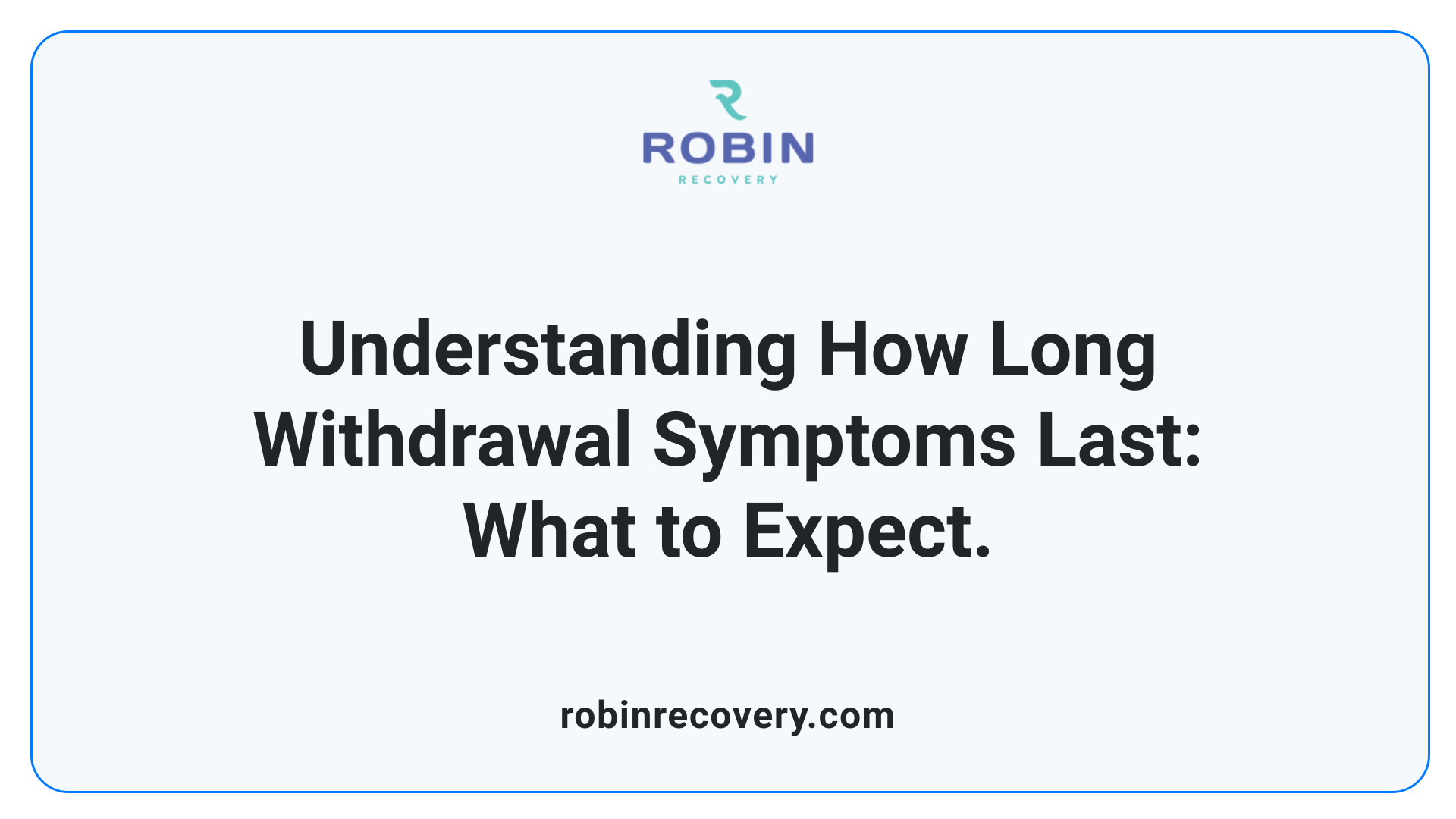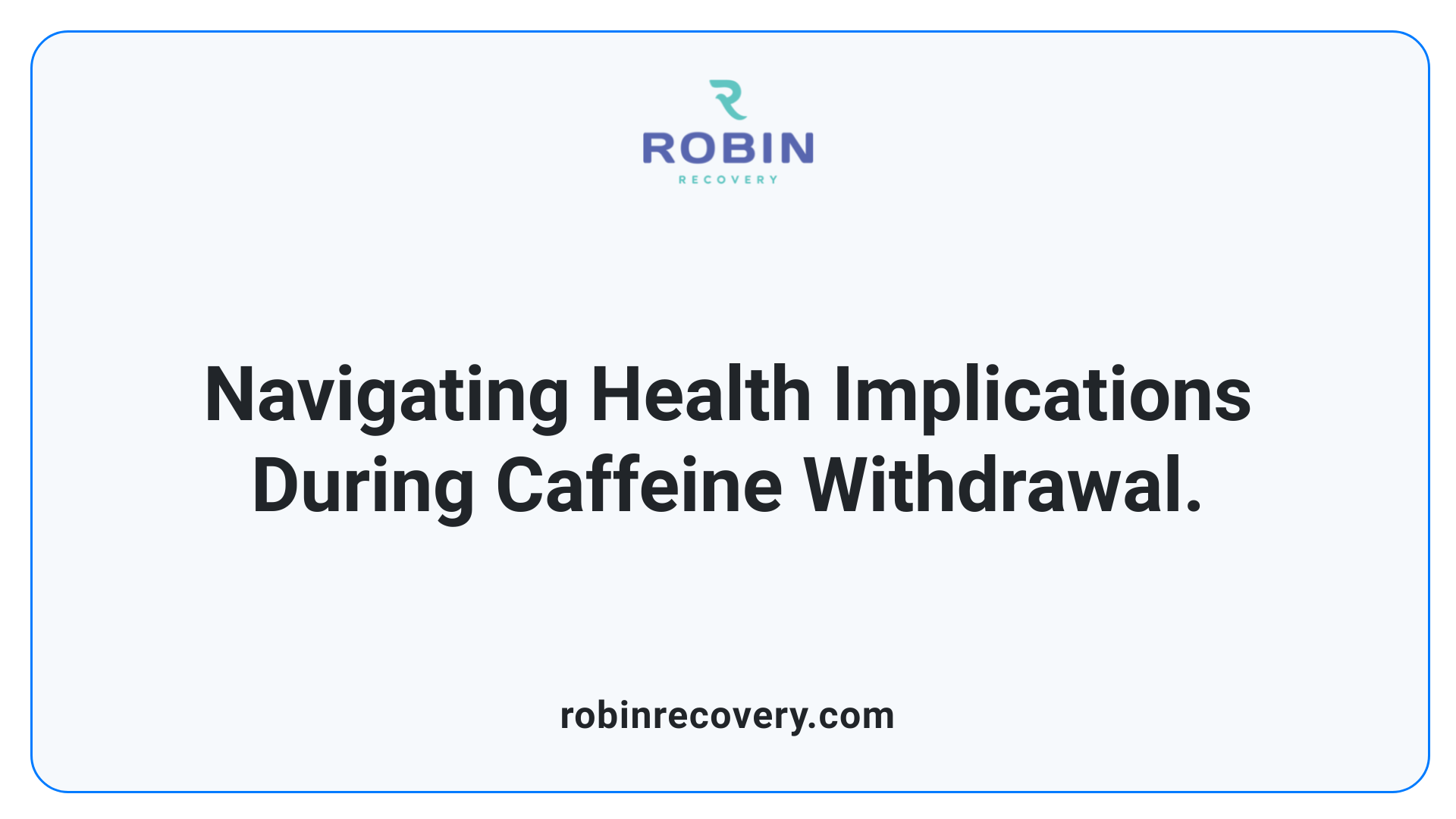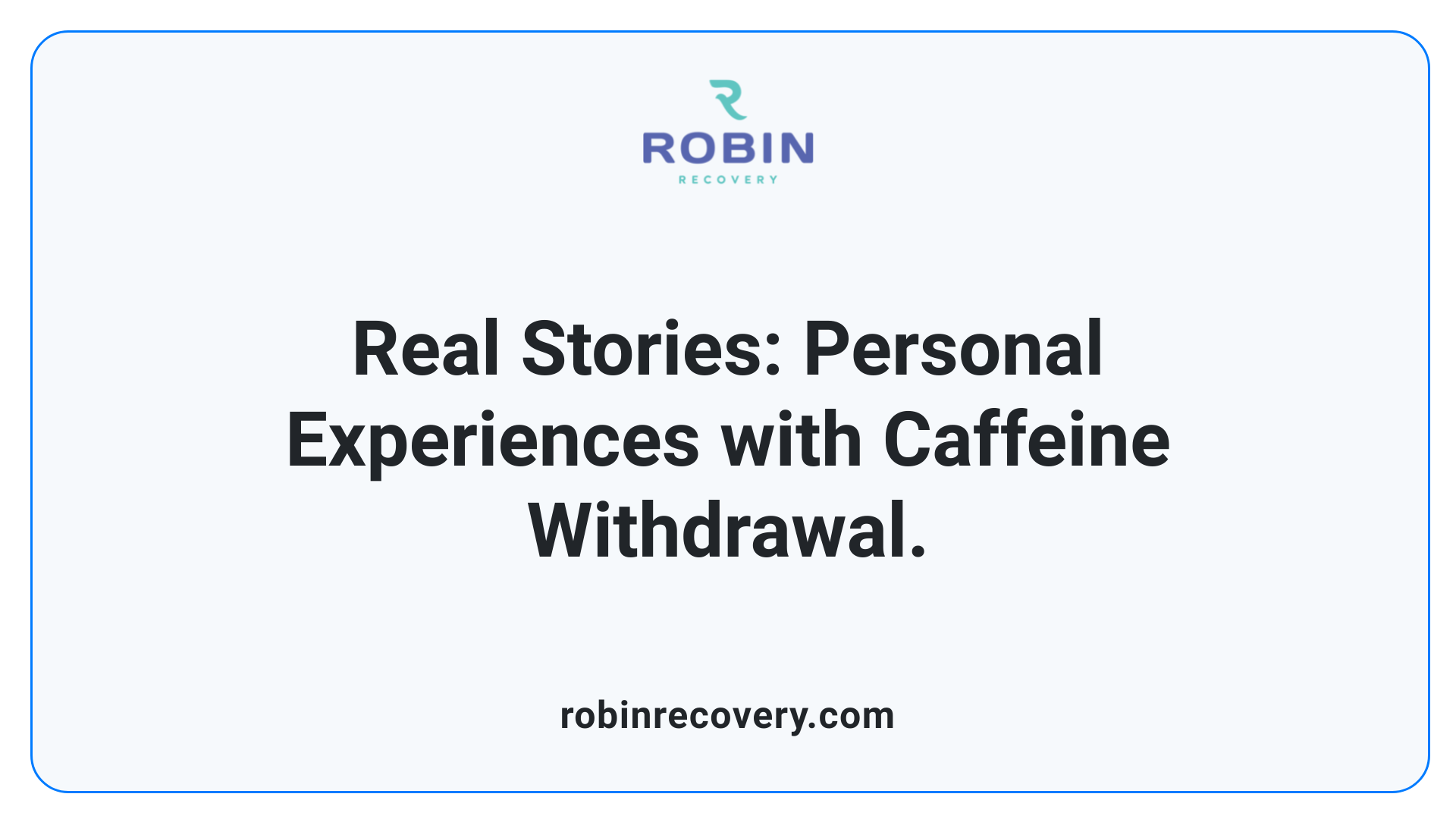How Long Does It Take to Break a Caffeine Addiction

Introduction
For many, caffeine is a daily ritual, a necessity without which they can't begin their day. Yet, the growing awareness of its potential dependency has led many to consider breaking the habit. But how long does it take to break a caffeine addiction, and what should one expect in the process? This article explores the timeline, symptoms, and methods for effectively managing caffeine withdrawal.
Symptoms of Caffeine Withdrawal

What are the symptoms of caffeine withdrawal?
Caffeine withdrawal can lead to a variety of uncomfortable symptoms. Commonly reported effects include:
- Headaches: Often severe, these headaches can resemble migraines and are caused by the dilation of previously constricted blood vessels in the brain due to the absence of caffeine.
- Fatigue: Caffeine typically blocks adenosine receptors that promote sleepiness. When caffeine intake is halted, fatigue sets in as the body adjusts to its absence.
- Anxiety and Irritability: These symptoms stem from the physiological dependence on caffeine, resulting in mood changes as the body seeks to adapt.
- Difficulty Concentrating: Mental fogginess and reduced focus can occur, as caffeine significantly impacts cognitive performance and alertness.
- Depressed Mood: Some individuals may experience feelings of sadness or irritability during withdrawal.
- Additional Symptoms: Nausea, dizziness, and light-headedness may also manifest as part of the withdrawal process.
When do withdrawal symptoms begin?
Withdrawal symptoms generally commence within 12 to 24 hours after the last intake of caffeine. The severity and onset can depend on the amount of caffeine consumed prior to cessation. For heavy users, symptoms may appear closer to the 12-hour mark.
How long do symptoms last?
The duration of caffeine withdrawal symptoms varies, typically lasting from 2 to 9 days. Peak withdrawal effects can occur between 20 to 51 hours after stopping caffeine. While most symptoms begin to dissipate after about one week, some individuals may continue to feel residual effects for a longer period, especially if they have a history of high caffeine consumption.
Symptom Onset Time Frame Typical Duration Headaches 12 to 24 hours Up to 9 days Fatigue 12 to 24 hours 2 to 9 days Anxiety/Irritability 12 to 24 hours 2 to 9 days Difficulty Concentrating 12 to 24 hours 2 to 9 days Depressed Mood 12 to 24 hours 2 to 9 days Nausea 12 to 24 hours Varies but can last days
Duration of Caffeine Withdrawal Symptoms

How long does caffeine withdrawal last?
Caffeine withdrawal can last for about two weeks, but the duration varies significantly based on individual factors such as prior intake levels and overall dependence. Symptoms typically begin 12 to 24 hours after the last dose, peaking within the first few days, particularly around 24 to 51 hours after cessation.
Most withdrawal symptoms improve substantially by days 5 to 9, with many people returning to a sense of normalcy after approximately one week without caffeine. Common symptoms during this period include:
- Headaches: Often severe, resembling migraines.
- Irritability: Heightened emotional responses.
- Fatigue: An overwhelming sense of tiredness due to the change in neurotransmitter functions.
- Cognitive Issues: Difficulty concentrating and mental fogginess.
While withdrawal might not pose significant health threats, the discomfort can be quite challenging. Over-the-counter medications and home remedies can alleviate symptoms. Staying hydrated is crucial to managing headaches and fatigue as the body adjusts.
Factors influencing duration
Several factors influence how long caffeine withdrawal symptoms last:
- Consumption Levels: Higher regular intake can lead to more severe withdrawal symptoms.
- Dependence Duration: Long-term caffeine users often experience longer withdrawal periods.
- Individual Metabolism: Different metabolic rates can lead to variations in how quickly symptoms subside.
In summary, recognizing these factors can help set realistic expectations and improve the experience of quitting caffeine.
Health Implications of Caffeine Withdrawal

Is caffeine withdrawal dangerous?
Caffeine withdrawal is usually not considered dangerous, but it can result in a range of uncomfortable symptoms. These include headaches, irritability, fatigue, anxiety, and nausea. Most individuals can manage these symptoms without medical intervention, particularly if they taper off their caffeine intake gradually.
The symptoms typically begin 12 to 24 hours after stopping caffeine and can last anywhere from 2 to 9 days. For those who abruptly quit, the discomfort may be more pronounced, peaking within the first few days.
However, in individuals with underlying health issues, there can be additional risks. Severe withdrawal symptoms such as vomiting or diarrhea could lead to dehydration, necessitating medical attention. It is crucial for those at risk to maintain hydration and adequate nutrition during this period.
To minimize withdrawal effects, minimizing caffeine intake incrementally, rather than stopping suddenly, is recommended. This enables a smoother transition and helps alleviate withdrawal discomfort. Staying well-hydrated and ensuring ample rest are also effective strategies to manage symptoms as the body adjusts to functioning without caffeine.
Effective Strategies for Managing Caffeine Withdrawal

How can you remedy caffeine withdrawal?
To effectively manage caffeine withdrawal, the most recommended approach is a gradual reduction in caffeine intake. Halting caffeine intake abruptly can lead to heightened withdrawal symptoms such as severe headaches and irritability. A practical method involves slowly tapering your consumption, for instance, reducing intake by about 10% every couple of weeks. This approach allows your body to adjust more comfortably to lower caffeine levels rather than experiencing a sudden shock.
Hydration plays a crucial role in alleviating symptoms as well. Drinking plenty of water can help combat headaches and fatigue, which are common during the withdrawal period. It’s also helpful to use over-the-counter pain relievers like ibuprofen or acetaminophen to ease headache discomfort.
Incorporating healthy lifestyle changes can also support your transition. Activities such as brisk walking or engaging in light exercise can boost energy levels and improve mood without relying on caffeine. Additionally, prioritizing sleep is essential; establishing a regular sleep schedule can help overcome tiredness and support your body's natural recovery from caffeine dependence.
Here’s a quick overview of some effective remedies:
Strategy Description Gradual reduction Reduce caffeine intake 10% every couple of weeks to ease withdrawal symptoms. Stay hydrated Increase water intake to combat headaches and fatigue. Use pain relievers Over-the-counter medications can help mitigate headaches. Engage in light exercise Activities like walking can boost energy and improve mood. Ensure adequate sleep A consistent sleep schedule aids the body’s adjustment process.
By employing these strategies, you can navigate caffeine withdrawal more effectively and experience a smoother transition.
Quitting Cold Turkey vs. Gradual Reduction
Pros and Cons
Quitting caffeine can be approached in two primary ways: cold turkey or gradual reduction. Here’s a breakdown of each strategy to understand their implications better.
Cold Turkey
Pros:
- Immediate cessation of caffeine intake.
- Quick adjustment to a caffeine-free lifestyle.
Cons:
- Potentially severe withdrawal symptoms such as headaches, fatigue, and irritability.
- Symptoms may last between 2 to 9 days, peaking around 24 to 51 hours after the last dose.
Gradual Reduction
Pros:
- Fewer withdrawal symptoms due to a more manageable transition.
- Ability to maintain daily routines with less discomfort, allowing the body to gradually adapt.
Cons:
- Longer timeline for quitting, as it requires consistent reduction over a period of 4 to 6 weeks.
Expert Recommendations
Quitting caffeine cold turkey is generally not deemed dangerous; however, unpleasant withdrawal symptoms can arise and may disrupt daily life. According to health professionals, a gradual tapering method is preferable. This includes reducing daily intake by about 10% every few weeks and replacing caffeinated drinks with herbal teas or decaf options. Staying hydrated and ensuring adequate sleep are also advised for a smoother transition.
In summary, while both approaches are possible, gradual reduction is often recommended to lessen discomfort and increase the likelihood of successfully overcoming caffeine dependency.
Resetting Caffeine Dependence
How long does it take to reset caffeine dependence?
Resetting caffeine dependence typically takes about a week. During this time, many coffee drinkers report a significant reduction in withdrawal symptoms such as fatigue and headaches. These symptoms often peak between 24 to 51 hours after cessation and usually start to subside within a few days.
The body's transition hinges on biological changes following the cessation of caffeine. Regular caffeine intake increases the number of adenosine receptors in the brain, creating a dependence as the brain becomes accustomed to the stimulating effects of caffeine. When caffeine intake is suddenly halted, these receptors remain unfilled, leading to withdrawal symptoms as the body adjusts. Over approximately eight days without caffeine, these excess adenosine receptors can start to decrease, facilitating a gradual reset of the brain's chemistry.
Additionally, individuals may notice improvements in their overall well-being, such as better sleep quality and increased energy levels, roughly two weeks after quitting caffeine completely. This timeline varies per individual, but consistency in avoiding caffeine generally leads to restored sensitivity to stimulants, allowing previously regular users to feel the effects of caffeine more acutely when they do choose to consume it again.
Biological processes involved
Caffeine primarily functions as an adenosine antagonist, blocking adenosine's calming effects and promoting wakefulness. Over time, as caffeine is introduced regularly, the body compensates by increasing adenosine receptor density, resulting in a higher tolerance and dependence.
When caffeine consumption ceases, the withdrawal effects serve as a signal of the brain's adaptation process. Symptoms like headaches, irritability, and fatigue occur as the body works to balance its receptor levels back to a baseline state. Staying hydrated and gradually tapering off caffeine can help ease this transition, making the process smoother for those looking to break their caffeine reliance.
The Role of Diet and Hydration during Caffeine Withdrawal
Importance of Hydration
Staying well-hydrated is crucial during caffeine withdrawal. Individuals may experience headaches, fatigue, and even irritability as withdrawal symptoms. Adequate fluid intake can alleviate dehydration-related effects, particularly headaches, which are commonly reported during this period. Drinking water consistently throughout the day helps maintain optimal hydration levels. Additionally, herbal teas or electrolyte-rich drinks can be beneficial, providing hydration while helping to manage some withdrawal symptoms.
Dietary Adjustments
Making thoughtful dietary changes can also ease the caffeine withdrawal experience. Consuming regular meals with a balanced mix of proteins, carbohydrates, and healthy fats can stabilize energy levels. It’s essential to avoid high-sugar foods that might lead to energy crashes. Some individuals find that incorporating foods rich in magnesium—like leafy greens, nuts, and whole grains—may help reduce irritability and fatigue. Moreover, eating smaller, frequent meals can help keep energy steady throughout the day.
Incorporating these hydration and dietary strategies during caffeine withdrawal can significantly improve comfort and aid in the transition to a caffeine-free lifestyle. Maintaining a well-rounded diet and adequate hydration plays a vital role in minimizing withdrawal symptoms.
Personal Experiences and Anecdotes

Personal Stories of Caffeine Withdrawal
Many individuals have personal stories about their experiences with caffeine withdrawal. Some report feeling relatively minor symptoms, while others have found the process to be quite challenging. A common sentiment is the struggle with persistent headaches and fatigue, especially during the initial days of withdrawal.
One user shared that they attempted to quit cold turkey after consuming six cups daily for years. They experienced severe headaches within the first 12 hours, with symptoms peaking at about 36 hours. After three days of intense discomfort, they decided to taper off by mixing regular coffee with decaf, which significantly eased their symptoms.
Different Timelines for Withdrawal
Experiences of caffeine withdrawal can vary widely in duration. Some people find that their symptoms subside after just a few days, while others may experience discomfort for up to nine days. One individual noted that after a week without caffeine, they began to feel more energetic, but it took nearly two weeks before they felt completely back to normal.
Another anecdote highlighted the importance of gradual reduction. A user mentioned successfully quitting caffeine by reducing their daily intake by 10% every two weeks, which allowed them to avoid the worst symptoms altogether. Their withdrawal experience lasted only five days, demonstrating how individual consumption levels and methods of cessation can significantly affect the timeline of withdrawal symptoms.
Long-Term Benefits of Reducing Caffeine Intake
Health Improvements
Reducing caffeine intake can lead to significant health improvements over time. One of the most notable changes is enhanced sleep quality. As your body adjusts to functioning without caffeine, many former caffeine users report falling asleep faster and experiencing deeper sleep cycles. This can lead to increased alertness and improved overall mental clarity throughout the day.
Additionally, abstaining from caffeine can help reduce anxiety levels. Since caffeine is a stimulant, it can exacerbate feelings of nervousness or restlessness. By eliminating or reducing your caffeine consumption, many individuals find a notable decrease in anxiety and an improved sense of calm and focus.
Benefits of Abstaining
Beyond mental health benefits, quitting caffeine can also enhance hydration. Caffeine is a diuretic, which means it can lead to increased urine output and dehydration. Reducing caffeine allows the body to stabilize its fluid balance, promoting better hydration and wellness overall.
Moreover, energy levels become more stable over time without the ups and downs associated with caffeine dependency. As the body adapts to functioning without quick energy boosts from caffeine, many users report feeling more consistently energized throughout the day without the crashes experienced after consuming caffeinated beverages.
Benefit Impact on Health Notes Improved Sleep Better sleep quality, deeper sleep cycles More alert and focused during the day Reduced Anxiety Lower levels of anxiety and improved calmness More mental stability Better Hydration Enhanced fluid balance Regular hydration is vital Stable Energy Levels Consistent energy without crashes Avoids dependency on stimulants
These long-term benefits underscore the potential for a healthier lifestyle after reducing caffeine intake, making it a worthwhile consideration for many.
Understanding Caffeine Dependency
What causes dependency
Caffeine dependency develops due to the frequent consumption of caffeine-containing beverages, where the body starts to rely on caffeine's stimulating effects. Regular intake alters neurotransmitter levels, particularly affecting adenosine receptors that promote wakefulness. When caffeine is eliminated suddenly, individuals experience withdrawal symptoms, which indicate the physiological and psychological reliance on this stimulant.
Withdrawal symptoms typically begin 12 to 24 hours after cessation, peaking between 20 to 51 hours. Common symptoms such as headaches, fatigue, irritability, and difficulty concentrating underscore the challenges faced by those looking to quit.
Effect on health
Despite caffeine’s stimulating effects, its overconsumption can lead to various health issues. Chronic high intake is associated with anxiety, sleep disturbances, and digestive problems. However, moderate caffeine consumption is generally considered safe and may even offer benefits like improved cognitive function and alertness.
To reduce dependency, it is recommended to gradually taper off caffeine rather than quit abruptly. This approach helps mitigate withdrawal symptoms, leading to a more comfortable transition away from caffeine.
Conclusion
Breaking a caffeine addiction is a personal and often challenging journey that varies among individuals. Understanding the symptoms and timeline, employing effective management strategies, and acknowledging the health benefits can facilitate the process of becoming caffeine-free. Whether you choose to gradually taper off or quit cold turkey, the ultimate goal is to regain control over your caffeine consumption and enjoy a healthier lifestyle. As you embark on this journey, remember that persistence and patience are key to overcoming caffeine dependency.
References
- How Long Does Caffeine Withdrawal Last? - Healthline
- Caffeine Withdrawal: Symptoms, How Long it Lasts, Relief - Health
- How to quit caffeine without withdrawal symptoms
- Caffeine Withdrawal: Symptoms, Timeline, & Treatment
- How Long Does it take to Break a Caffeine Addiction?
- How to Manage Caffeine Withdrawal - Baptist Health
- Caffeine Withdrawal Symptoms - What to Expect When Quitting
- 8 Symptoms of Caffeine Withdrawal - Healthline
- Caffeine Withdrawal: 7 Symptoms and How Long They Last
